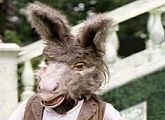Perchance to Dream: Sleeping and dreaming
Sleep is not unconsciousness, such as the state created by anaesthetics
- after all, a sudden noise is all it takes to wake us up! The amount
of sleep we need varies throughout our life - newborn babies seem
to spend most of their time asleep, just waking up for food. We
need less sleep as we grow older. Sleep has different stages: R.E.M.
(Rapid Eye Movement) sleep occurs several times during a good night's
sleep, and this is when dreaming is believed to take place. Although
we benefit from the rest, we need to dream. 
This month we look at collections relating to beliefs and traditions surrounding our slumbers, and some of the practicalities involved, and have also selected some web links.
left: miniature bed created by Christina
W Bell. Photograph by Mark Galloway, copyright ©
Glasgow Caledonian University Archives, The Christina W Bell Collection
Collections
- Folklore collection of Alexander Carmichael (1832-1912) and W. J. Watson (1865-1948), includes prayers before sleep.
- James Thomson (1834-1882): pessimistic poet prone to sleep problems.
- Newscuttings collection: from English newspapers dating from 1890-1915; these include an article on "How to get to sleep".
- Hugh Boustead (1895–1980): recollections of Russia include a Cossack cradle song.
- James William Dell (born around 1880): took part in the British National Antarctic Expedition, 1901-1904 (leader Robert Falcon Scott); Dell used his sail-making skills to produce sleeping bags.
- George Steedman Riddell (1890-1973): Fife public health official, involved in matters of billeting and air raid shelters.
- Demonology collection: a 19th century manuscript which includes notes on incubi and succubi (demons said to visit us while we sleep).
- William Cowper (1731-1800): poet who kept dream diaries.
- Cadwaladr Davies ( fl 1740): Merioneth schoolmaster and poet with an interest in interpreting dreams.
- Georg Groddeck (1866-1934): a founder of psychosomatic medicine, who liked to recount his dreams.
- Sigmund Freud (1856-1939): founder of psychoanalysis and author of The interpretation of dreams, 1899.
Links
- Gothic Nightmares: exhibition at Tate Modern, London (February 15th - May 1st, 2006). The exhibition includes The Nightmare, 1781, by Henry Fuseli (1741-1825)
- Shelters: during the 1940-1941 Blitz, many Londoners sheltered and slept in Tube stations (Imperial War Museum).
- Sleeping Well (Royal College of Psychiatrists)
- Sleep Council: non-profit organisation promoting the benefits of a good night's sleep and the importance of buying a good bed.
- British Sleep Society: professional organisation for medical, scientific and healthcare workers dealing with sleeping disorders [website requires frames]
- Sleep Research Centre (University of Loughborough)





